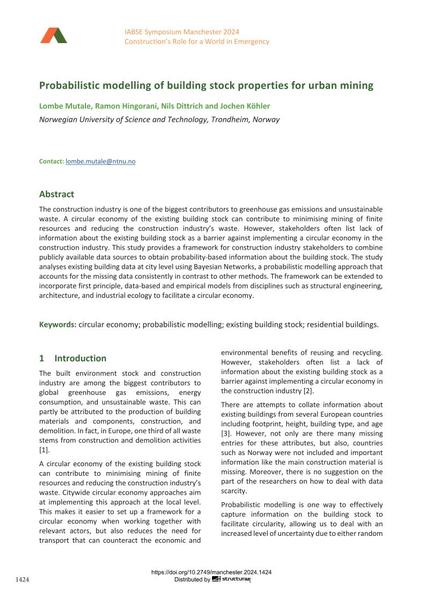Probabilistic modelling of building stock properties for urban mining

|
|
|||||||||||
Bibliographic Details
| Author(s): |
Lombe Mutale
(Norwegian University of Science and Technology, Trondheim, Norway)
Ramón Hingorani (Norwegian University of Science and Technology, Trondheim, Norway) Nils Dittrich (Norwegian University of Science and Technology, Trondheim, Norway) Jochen Köhler (Norwegian University of Science and Technology, Trondheim, Norway) |
||||
|---|---|---|---|---|---|
| Medium: | conference paper | ||||
| Language(s): | English | ||||
| Conference: | IABSE Symposium: Construction’s Role for a World in Emergency, Manchester, United Kingdom, 10-14 April 2024 | ||||
| Published in: | IABSE Symposium Manchester 2024 | ||||
|
|||||
| Page(s): | 1424-1432 | ||||
| Total no. of pages: | 9 | ||||
| DOI: | 10.2749/manchester.2024.1424 | ||||
| Abstract: |
The construction industry is one of the biggest contributors to greenhouse gas emissions and unsustainable waste. A circular economy of the existing building stock can contribute to minimising mining of finite resources and reducing the construction industry’s waste. However, stakeholders often list lack of information about the existing building stock as a barrier against implementing a circular economy in the construction industry. This study provides a framework for construction industry stakeholders to combine publicly available data sources to obtain probability-based information about the building stock. The study analyses existing building data at city level using Bayesian Networks, a probabilistic modelling approach that accounts for the missing data consistently in contrast to other methods. The framework can be extended to incorporate first principle, data-based and empirical models from disciplines such as structural engineering, architecture, and industrial ecology to facilitate a circular economy. |
||||
| Keywords: |
residential buildings Circular economy probabilistic modelling existing building stock
|
||||
